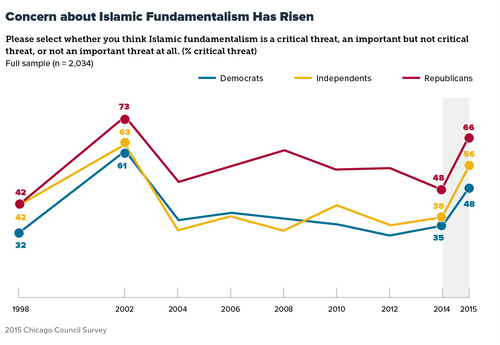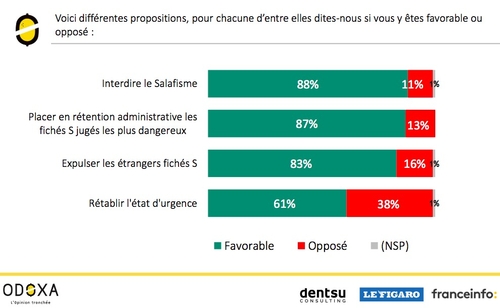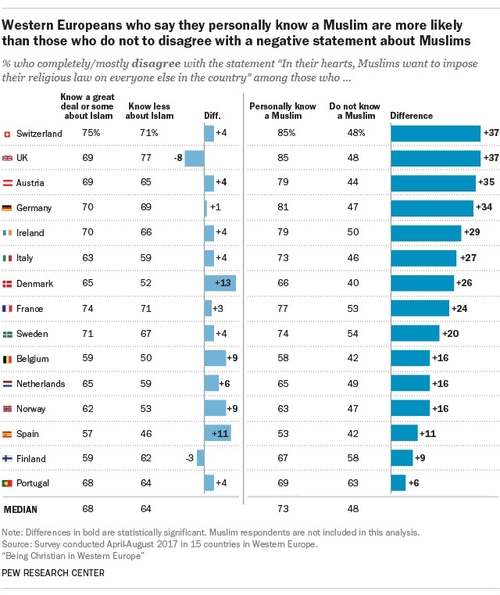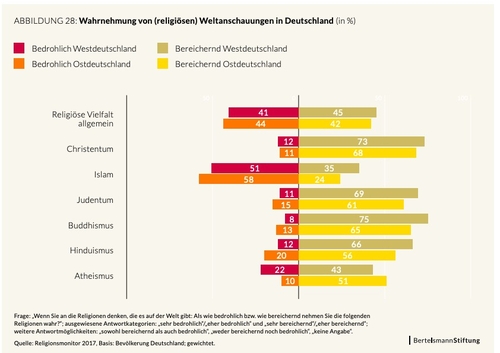As non-Muslims come to understand the Islamist challenge, anti-Islamic sentiments in the West are increasing, probably at a faster rate than Islamic practices. As anti-Islam trumps Islam, (I have concluded) opinions "will grow yet more hostile to Islamism over time. In this way, Islamist aggression assures that anti-Islamism in the West is winning its race with Islamism."
Correct prediction? To keep track, this weblog entry documents the course of Western public opinion on a bundle of topics connected to Islam, including democracy, immigration, jihad, Shari'a, and women. (For a related topic, see my web log on "The Burqa Wars.) The polls are consistent:
Germany, as reported by the Institut für Demoskopie Allensbach in November 2012:
- 56 percent: striving for political influence
- 60 percent: revenge and retaliation
- 64 percent: violence
- 68 percent: intolerance toward other faiths
- 70 percent: fanaticism and radicalism
- 83 percent: discrimination against women
In contrast, only 7 percent of Germans associate Islam with openness, tolerance, or respect for human rights.
France, mostly from early 2013:
- 67 percent say Islamic values are incompatible with those of French society
- 70 percent say there are too many foreigners
- 73 percent view Islam negatively
- 74 percent consider Islam intolerant
- 84 percent are against the hijab in private spaces open to the public
- 86 percent are favorable to strengthening the ban on the burqa
The Netherlands, as reported by Maurice de Hond in June 2013 (English summary here).
- 55 percent: stop immigration from Muslim countries
- 63 percent: no new mosques
- 64 percent: the arrival of immigrants from Muslim countries does not benefit the country
- 68 percent: there is enough Islam in the Netherlands (a view shared by a majority of voters from all political parties)
- 72 percent: pass a constitutional banning Shari'a law
- 73 percent: a relationship exists between Islam and recent terror acts in Boston, London and Paris
- 77 percent: Islam does not enrich the country
Australia, from the Roy Morgan Research Ltd in October 2013 and reported today:
- 38 percent: a growing Islamic population and Islamic immigration are bad for Australia
- 44 percent: strong, clear link between Islam and terrorism
- 50 percent want the Shari'a banned
- 53 percent: ban the burqa from public spaces
- 57 percent: Concerned about Islam in the world today
- 70 percent: Australia is not becoming a better place because of Islam.
Comment: Negativity toward Islam is much less pronounced in Australia than in France, Germany, and the Netherlands. Will it stay low or increase over time? I expect the latter. (November 24, 2013)
Canada, from the Leger Marketing polls asking whether Western and Islamic societies are "irreconcilable" finds the following believe they are:
- 63 percent of Protestants
- 62 percent of Jews
- 60 percent of Catholics
- 46 percent of the non-religious
- 42 percent of Muslims
(March 26, 2015)
Many countries: The Pew Research Center finds that "Extremism Concerns Growing in West and Predominantly Muslim Countries: Worries Especially Widespread in Western Europe and U.S." (July 16, 2015)
 Pew findings. |
United States: A Chicago Council on Global Affairs survey finds that the rise of ISIS has caused American concern about Islamism to jump 15 percentage points over the 2014 survey, returning to near the post-9/11 levels. (September 15, 2015)

France: Asked in a survey by the Journal de Dimanche about the marriage of a child to various partners, Muslims came in last, with
- 52 percent frowning on a son marrying a Muslim woman
- 56 percent against a daughter marrying a Muslim man
(January 31, 2016)
Germany: Infratest dimap reports that:
- 44 percent fear that the refugees will too much change the German way of life.
- 52 percent worry about immigrants too much increasing the influence of Islam on Germany.
- 58 percent criticize the established political parties (the CDU/CSU, SPD, Greens, Left and FDP) for not taking the problem of radical Islam seriously enough.
- 60 percent say that Islam does not belong in Germany (up from 47 percent in 2010).
- 72 percent fear a terrorist attack in Germany.
(May 12, 2016)
Belgium: The "Fondation Ceci n'est pas une crise" sponsored survey research in Belgium, "Noir, jaune, blues 2017: Quel monde voulons-nous bâtir?" that found:
- 43 percent: Muslims are not Belgians like others are.
- 43 percent: Muslims should return to their countries of origin.
- 44 percent: I would oppose my son marrying a Muslim woman.
- 47 percent: I would oppose my daughter marrying a Muslim man.
- 49 percent: I have a negative or very negative view of Muslims living in Belgium.
- 53 percent: Muslims do not respect us.
- 54 percent: Muslims refuse to integrate into our country.
- 54 percent replied "Muslims" when asked "Sometimes, one hears of problems with foreigners. Name me one or two categories who you think is being referred to."
- 54 percent: Muslims want to dominate us.
- 60 percent: Our Western values are endangered by those of immigrant Muslims.
- 63 percent: New Muslim immigrants want to impose on us their way of life.
- 63 percent: Muslims endanger our identity.

(January 2, 2017)
United Kingdom: YouGov reports on British views of Arabs:
- 28 percent think Arab migrants and refugees are beneficial to Britain
- 55 percent endorse racial profiling of Arabs and Muslims
- 63 percent say that Arabs who migrated to the UK and Europe have failed to integrate into Western societies
- 69 percent think the UK should take in fewer refugees from Syria and Iraq
(September 25, 2017)
France: An Odoxa-Dentsu Consulting poll finds:
- 83 percent: Expel from France the Fiche S designees. (French law enforcement secretly flags an individual deemed a threat to national security with "Fiche S"; of an estimated 20,000 such designees, half are Islamists.)
- 87 percent: Place the most dangerous Fiche S designees under administrative detention.
- 88 percent: Prohibit Salafism.

Comments:
(1) These high numbers confirm my prediction that anti-Islamist sentiments will keep increasing. Don't be surprised to see them reach 90 percent and more.
(2) The Islamist threat is so well known that 99 percent of the French population now expresses an opinion on Salafism; 20 years ago, that figure would have been more like 1 percent. We are all getting educated in matters Islamic.
(3) 87 percent favoring administrative detention is a huge number wanting potential jihadis locked up before they can act. Put differently, they want the jihadis interned, as idea I have been discussing since 2004. (March 29, 2018)
Europe: Here's a Pew Research Centerpoll that contradicts all the others on this page. Titled "In Western Europe, familiarity with Muslims is linked to positive views of Muslims and Islam," it finds that non-Muslim who personally know at least one Muslim are on average 25 percent less likely (73 percent vs 48 percent) to believe that "In their hearts, Muslims want to impose their religious law on everyone else in the country."

This implies that as the Muslim population grows, and more non-Muslim get to know it, concerns about Islamic supremacism and Shari'a will diminish. That would seem to contradict all trends as well as common sense. (July 28, 2018)
Sweden: An annual Diversity Index issued by the University of Gävle asks about five religions and whether they promote negative values, such as ones that clash with human rights. From the left, Christianity, Buddhism, Hinduism, Judaism, and Islam.
 Does a religion promote negative values, such as ones that clash with human rights? |
(June 30, 2019)
Germany: A Bertelsmann Foundation study finds that 52 percent of Germans consider Islam to be a danger. The book-length study then analyses this fact every which-way.
 Red: Threatens western Germany. Orange: Threatens eastern Germany. Green: Enriches western Germany. Yellow: Enriches eastern Germany. From the top: All religions, Christianity, Islam, Judaism, Buddhism, Hinduism, atheism. |
(July 11, 2019)
France: An IFOP survey for Le Journal du Dimanche finds much worrying about Islam:
- 61 percent: Islam is "incompatible with the values of French society"
- 68 percent: Close Koranic schools
- 73 percent: Prohibit conspicuous signs of religion among parents accompanying students on school trips (a seemingly obscure issue but one that has flared up of late)
- 78 percent: The landmark 1905 legislation that separates church and state "is in danger"
- 80 percent: Laïcité (secularism, but more aggressive than the English term implies) "is treated differently in the Muslim religion"
- 82 percent: Prohibit all prayers on streets and other religious ceremonies in public places
(October 26, 2019)
